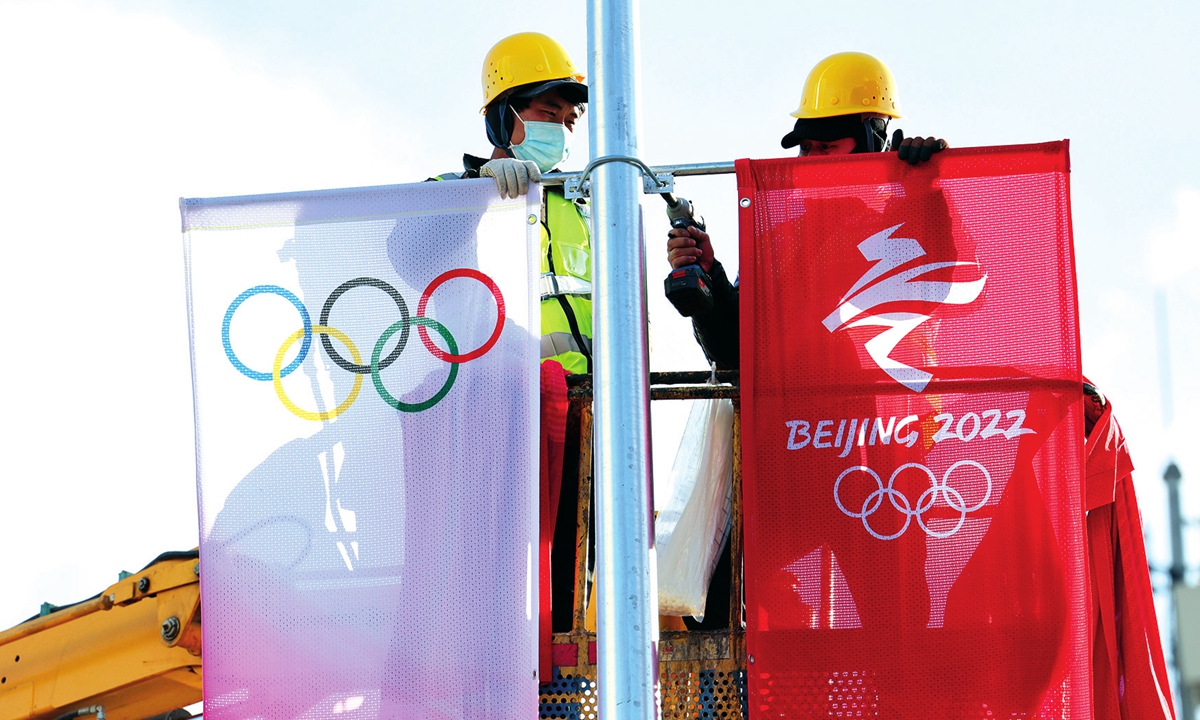
Workers hang banners with logos of Olympic Games and Beijing 2022 Winter Olympic Games by a road in Beijing on January 10, 2022. Photo: VCG
The US move to bully two Chinese sponsors for the 2022 Beijing Winter Olympic Games over the fabricated "forced labor" allegation in Xinjiang has triggered heated criticism and protests from Chinese scholars, who accuse the US government of using the apolitical Olympic Games to defame China.
The US' mudslinging tactic is mean and despicable, they say, and it will only increase obstacles for US companies that have business connections with the Chinese market, as the US government is becoming the "biggest stumbling block" for US companies in China, as one economist put it.
They made the comments after the US Congressional-Executive Commission on China (CECC) wrote a letter to the International Olympic Committee (IOC) on Wednesday to express concern over two Chinese companies, Anta and HYX Group, as to whether they use cotton grown in Xinjiang Uygur Autonomous Region in the uniforms they made for the 2022 Winter Games.
In the letter, which was posted on the CECC's website, the CECC demanded that the IOC make public a copy of the certificate of origin given to the IOC by HYX to confirm that the company's clothing products for the Winter Olympics were not produced by so-called "forced labor", so that the Olympic Games' attendees will not be wearing garments that are, in the commission's expression, "contaminated."
HYX declined to comment on the issue for the time being when contacted by the Global Times on Thursday. Anta had not commented as of press time.
The IOC didn't respond to a media request from the Global Times as of press time.
Chinese officials and experts unanimously lashed out against the US for fabricating groundless accusations against China and extending its politicizing actions to the area of international sports.
Wang Wenbin, a spokesperson of the Chinese Foreign Ministry, said during a press conference on Thursday that the so-called CECC is always biased against China while making untrue remarks on China-related issues. The CECC has no political credibility at all, he said.
"The so-called lie of forced labor in Xinjiang has gone bankrupt, and except for certain anti-China forces that have ulterior motives, anyone who respects facts and has a conscience would not believe in this despicable speculation," noted Wang.
Some analysts said that the IOC has its own regulations in choosing sponsors. The fact that the two Chinese firms are on the IOC's list of sponsors proves that their products meet the IOC's standards.
The IOC chose HYX as its formal uniform supplier, meaning that the company was chosen to supply the official uniforms to the IOC members and administration for the 2020 Tokyo Olympic Games and the 2022 Beijing Winter Olympics Games.
Anta, as the IOC's official sportswear uniform suppliers, will supply IOC members and staff with sports apparel for more occasions, including the 2022 Winter Games and the YOG Dakar 2022.
Li Haidong, a professor from the Institute of International Relations of the China Foreign Affairs University, said that the US' interference in the IOC's and Chinese sponsors' affairs is another example of US efforts to politicize China-related issues as much as it can to blacken China's public image.
"There the US goes again to signal to other international organizations - this time the IOC, to throw mud at China... Such an action is nothing but short-sighted, tactless and despicable," Li told the Global Times on Thursday.
According to Li, it's absolutely reasonable that a Chinese company uses Xinjiang-grown cotton in its products, not to mention that the claims of so-called "forced labor" have proved to be groundless accusations.
The analysts also noted that with such repeated bullying actions, the US government is increasingly becoming the "biggest stumbling block" for its companies to expand their business in overseas markets.
"What the US eyes is decoupling with China, which is an impossible thing, considering the two countries' business connections. What it is doing is just wasting taxpayers' money and hurting the interests of US companies and individuals," Li said.
Data revealed by some leading US sportswear brands showed that they are already starting to pay the price for the US government's bullying policies. For example, Nike saw its revenues fall about 20 percent in China for the company's second quarter of fiscal 2022, the company's financial report showed.
Analysts also expressed confidence in the IOC's impartiality despite the pressure it is facing from the US government to take a stand on the Xinjiang cotton issue.
"It's a tradition of the IOC to respect its sponsors, and considering the Olympic spirit, I think they will make a rational judgment on the US request, as it's ridiculous to link the Olympics, a non-political international event, with politics," He Wenyi, executive director of the China Institute for Sports Value at Peking University, told the Global Times.




